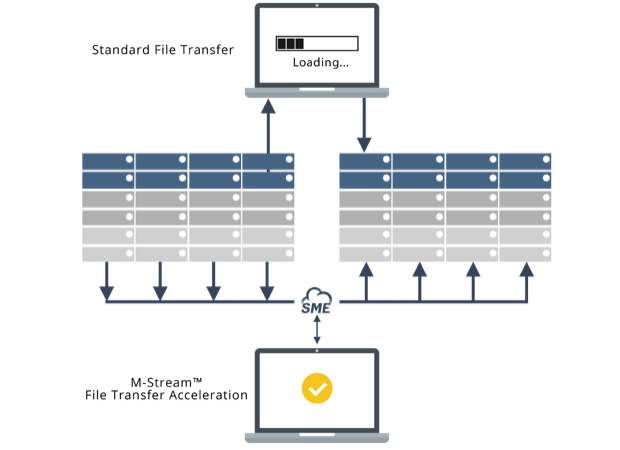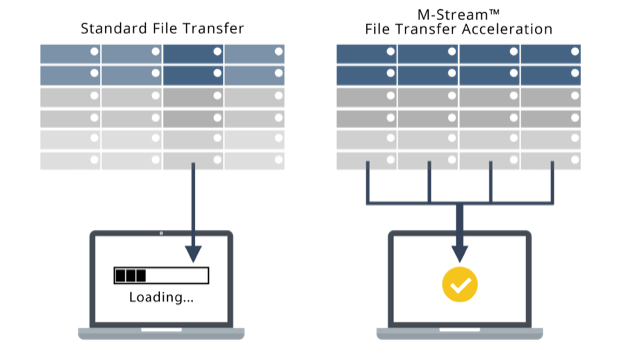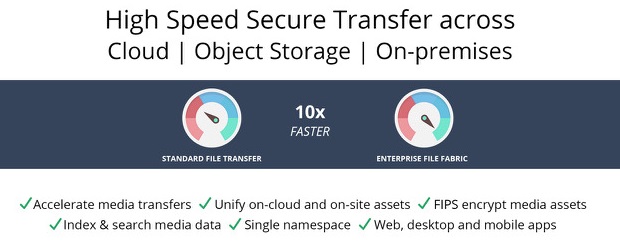Storage Made Easy is currently working on integrating the Quic (Quick UDP Internet Connection) as a general-purpose transport protocol for the M-Stream feature, to learn more see our recent interview with Jim Liddle, CEO at Storage Made Easy:

Q: For those who haven’t heard of it, what is the best way to describe Storage Made Easy?
A: We are a UK cloud computing software company that creates software for the Enterprise. We sell globally and our clients cross vertical but we have a focus on Service Providers, Healthcare, Legal, Finance, Education and Media and Entertainment industry.
Q: What types of products do you offer to your clients?
A: We offer a product called the Enterprise File Fabric which is available in three distinct product variants:
Enterprise File Fabric for Object Storage
Enterprise File Fabric for Governance and Compliance
Enterprise File Fabric for Media and Entertainment
 Recommended: DX Factor Has Recently Been Named One Of The Top 50 Tech Companies In The United States
Recommended: DX Factor Has Recently Been Named One Of The Top 50 Tech Companies In The United States
Q: One of the things that makes you unique is M-Stream File Transfer Acceleration. What exactly is it?
A: M-Stream, which stands for ‘multiple Streams’ speeds up the uploading, downloading and copying of very Large files. M-Stream splits these large files into pieces and sends them in parallel over multiple streams, and they are reassembled back into a single file at the target.
M-Stream uses normal TCP datagrams rather than UDP which is what a lot of file acceleration technology vendors use, the advantage being that it is totally non-proprietary and does not lock you into having to use the File Fabric to access the data.
Q: Can you give us insights into M-Stream’s features?
A: M-Stream supports CIFS/SMB, NFS, OpenStack Swift and S3-Compatible storage including Cloudian, Ceph, IBM COS and Google Cloud Storage.
It can work in a ‘cross cloud mode’ in which it can be used for file transfers between different data stores, including between file systems and object stores, across storage tiers, between data centers, and across private and public clouds.
M-Stream provides full tamperproof traceability through real-time Audit logs – who, what, when and where.
 Recommended: An Interview With Khurram Asif About Brexit And The Upcoming Recession
Recommended: An Interview With Khurram Asif About Brexit And The Upcoming Recession
Q: What are the main problems of copying files between storage providers?
A: Independent of copying files between different systems, or across storage tiers for processing, ad-hoc transfers of large volumes of data, can be very difficult. For example, a user would first download a file onto their local PC (if there’s enough room). Only when that’s successful can an upload to the target server begin, and they can send and hope that an unreliable network doesn’t derail the upload.
With M-Stream it is simply drag the file(s) from one location to another and close the laptop and walk away, knowing the transfer is going to complete and that it will be completed very quickly. It is that simple.
 Recommended: An Interview With John Moscatiello, Founder And CEO Of Marco Learning
Recommended: An Interview With John Moscatiello, Founder And CEO Of Marco Learning
Q: What can we expect from SME in the future?
A: We are currently working on integrating the Quic (Quick UDP Internet Connection) as a general-purpose transport protocol for the M-Stream feature. QUIC improves the performance of connection-oriented web applications, such as M-Stream, that are currently using TCP, by establishing a number of multiplexed connections between two endpoints over UDP. This works with HTTP/2’s multiplexed connections and allows multiple streams of data to reach all the endpoints independently. For us the key here is that Quic / UDP will be a standards based implementation of UDP that will be supported by every browser rather than some that is proprietary.
Activate Social Media:


